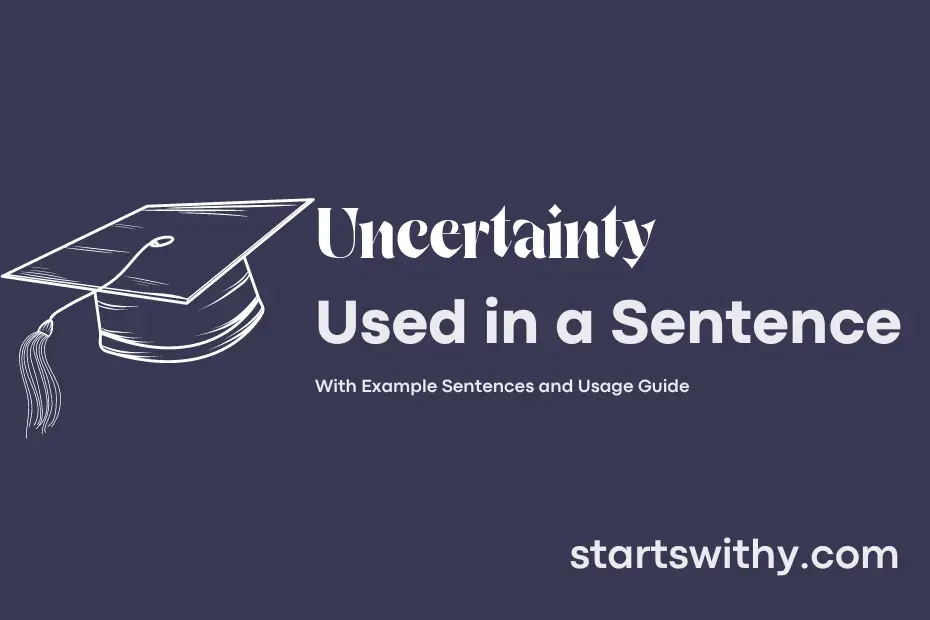Uncertainty is a term that encompasses the lack of knowledge or predictability about a situation. It denotes a state of doubt or ambiguity, where outcomes are difficult to foresee.
In both personal and professional realms, uncertainty can lead to stress and hesitation. Handling uncertainty requires adaptability and a willingness to embrace the unknown.
7 Examples Of Uncertainty Used In a Sentence For Kids
- Uncertainty means not knowing what will happen.
- Sometimes we feel uncertainty when we try new things.
- It’s okay to feel uncertainty sometimes.
- We can ask questions when we have uncertainty.
- When we have uncertainty, we can talk to a teacher or grown-up.
- Uncertainty can be scary, but it’s normal.
- It’s important to remember that uncertainty is a part of life.
14 Sentences with Uncertainty Examples
- Uncertainty about the exam schedule has caused a lot of stress among the college students.
- The sudden change in the syllabus has led to a sense of uncertainty about what to focus on for the upcoming tests.
- Students are facing uncertainty about their career paths and are unsure about the right course of action to take.
- The fluctuating attendance policies have created a sense of uncertainty among the students regarding their academic progress.
- The delay in receiving feedback on assignments has only added to the uncertainty about their performance in the course.
- The constantly changing guidelines for campus events have left students in a state of uncertainty about what activities they can participate in.
- The lack of communication from the administration has raised uncertainty about the college’s plans for the upcoming academic year.
- The constant rumors about campus closures due to the pandemic have fueled uncertainty among the students about the future of their education.
- The limited availability of study materials has added to the uncertainty about how to prepare effectively for exams.
- The delay in receiving scholarship notifications has only heightened the uncertainty among students about their financial situation.
- The conflicting information about internship opportunities has created uncertainty about where students should apply.
- The lack of certainty surrounding the exam dates has left students feeling uncertain about when to start studying.
- The constantly changing course requirements have caused uncertainty among students about which classes to enroll in.
- The vague instructions for assignments have led to uncertainty about what the professors are looking for in terms of quality and content.
How To Use Uncertainty in Sentences?
Uncertainty is used to express a lack of certainty or confidence about something. When using the word uncertainty in a sentence, it’s important to consider the context in which it is being used. One common way to use uncertainty is to express doubt or hesitation about a decision or outcome. For example, “I am filled with uncertainty about which university to choose for my studies.”
Another way to use uncertainty in a sentence is to describe a situation where the outcome is unknown or unpredictable. For instance, “The outcome of the project remains shrouded in uncertainty due to unforeseen circumstances.”
When using uncertainty in a sentence, it’s crucial to convey the feeling of doubt or lack of confidence. This can be done by using words like “doubt,” “hesitation,” “unknown,” or “unpredictable” in conjunction with the main word uncertainty.
Remember to pay attention to the tone and context of your sentence to ensure that the use of uncertainty accurately reflects the intended meaning. By practicing and incorporating uncertainty into your sentences, you can effectively convey the feeling of doubt or hesitation in your writing.
Conclusion
In conclusion, sentences with uncertainty are characterized by a lack of decisiveness or confidence in the information being conveyed. They often contain words like “maybe,” “possibly,” or “might,” indicating a level of doubt or ambiguity. These sentences are important in communication as they acknowledge the limitations of knowledge or the complexity of a situation.
By using sentences with uncertainty, speakers can convey humility, openness to different perspectives, and a willingness to consider other possibilities. It also allows room for further discussion, exploration, or clarification on a topic. Embracing uncertainty in our language helps promote a more inclusive and respectful dialogue where different viewpoints are valued, ultimately leading to a deeper understanding of the subject at hand.



